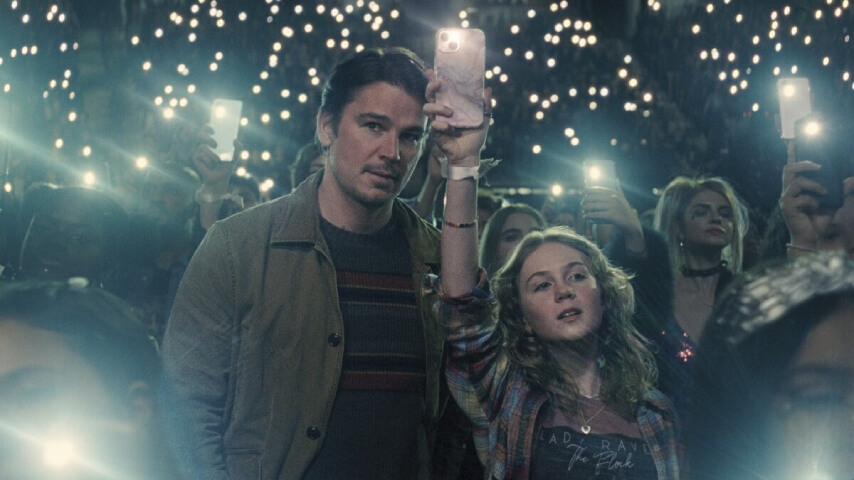Josh Hartnett squirms and plots through M. Night Shyamalan's perfectly thrilling Trap
Shyamalan thrives with a contained location, simple concept, and intimate cast. Trap has it all - it's hard not to be caught by its charms.
Photo: Warner Bros.
For the first 10 or 15 minutes of Trap, Cooper (Josh Hartnett) is in dad-joke heaven, and writer-director M. Night Shyamalan is right there along with him. Cooper is taking his tween daughter Riley (Ariel Donoghue) to the sold-out concert of pop star Lady Raven (Saleka Shyamalan, the filmmaker’s daughter) as a reward for a strong report card. Riley hasn’t quite reached the age where she’s fully, irrevocably embarrassed by her sweetly dorky father, which means he can get away with light teasing and joshing attempts to learn her slang—in between questions about her social life that evince a genuine and touching concern for her well-being. With all the awkward besweatered sincerity and sweetly arrhythmic cornball father-daughter chatter, Hartnett suppressing all traces of his former teenage cool, Shyamalan couldn’t be more in his element if the arena turned out to be haunted.
It’s not, but Cooper is, even as fusses over his daughter’s well-being. He may not be all that enamored of Lady Raven’s music—it’s heavy on the mid-tempo semi-bangers; pleasant, but not exactly Olivia Rodrigo or Taylor Swift-level cross-gen appeal—but he does his best to stay present and in the moment, perhaps aware that Riley will need a little capitulation to make up for attending the show with her dad, rather than friends (even if he scored halfway decent floor seats). Of course, Cooper, like most dads, is only human, and can’t help himself from occasionally glancing at his phone—not for the news, or the score of the big game, or whatever the kids are calling Twitter these days, but to keep an eye on the man he’s holding in the basement of some undisclosed location. Because Cooper is also a local Philadelphia serial killer called The Butcher—and Lady Raven’s show is also, improbably but just go with it, a massive sting operation. Law enforcement has figured out that the Butcher, whose identity remains a mystery to them, will be at the concert, and they’re hoping to make escape from the building near-impossible.
 Keep scrolling for more great stories.
Keep scrolling for more great stories.
